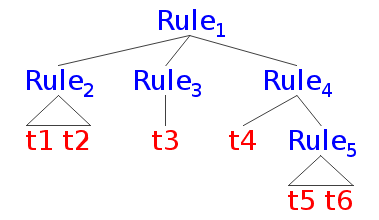Discussion Session 3¶
Usage of re.split¶
>>> import re
>>> re.split("aa|bb", "aaxxbxb xxxbbxbb") # without outmost parenthesis
['', 'xxbxb xxx', 'x', '']
>>> re.split("(aa|bb)", "aaxxbxb xxxbbxbb") # with outmost parenthesis
['', 'aa', 'xxbxb xxx', 'bb', 'x', 'bb', '']
We can create appropriate regular expression by combining all the keywords (not terminal) of the language.
>>> re.split("(=|\+|\*)", "xa = 1 + 2 * 3") # keywords: =, +, *
['xa ', '=', ' 1 ', '+', ' 2 ', '*', ' 3']
Warning
This method cannot be applied to practical languages. Try figuring out an example.
Itch of escape¶
>>> re.split("\\", "abc\\er\\")
Traceback (most recent call last):
File "/usr/local/lib/python3.4/sre_parse.py", line 194, in __next
c = self.string[self.index + 1]
IndexError: string index out of range
During handling of the above exception, another exception occurred:
Traceback (most recent call last):
File "<stdin>", line 1, in <module>
File "/usr/local/lib/python3.4/re.py", line 196, in split
return _compile(pattern, flags).split(string, maxsplit)
File "/usr/local/lib/python3.4/re.py", line 288, in _compile
p = sre_compile.compile(pattern, flags)
File "/usr/local/lib/python3.4/sre_compile.py", line 465, in compile
p = sre_parse.parse(p, flags)
File "/usr/local/lib/python3.4/sre_parse.py", line 739, in parse
source = Tokenizer(str)
File "/usr/local/lib/python3.4/sre_parse.py", line 182, in __init__
self.__next()
File "/usr/local/lib/python3.4/sre_parse.py", line 196, in __next
raise error("bogus escape (end of line)")
sre_constants.error: bogus escape (end of line)
>>> re.split("\\\\", "abc\\er\\")
['abc', 'er', '']
>>> re.split(r"\\", "abc\\er\\") # usage of r"xxxx"
['abc', 'er', '']
Note
We have met this problem in assignment1 when our language contains +,
*, and etc.
We have to take into consideration two layers of escape when using regular expression related functions of provided by a programming language.
- escape of literal string
- escape of regular expression
Representation of Tree¶

tree = {"Rule1", [
{"Rule2", [
t1,
t2
]},
{"Rule3", [
t3
]},
{"Rule4", [
t4,
{"Rule5", [
t5,
t6
]}
]}
]}
Note
Please come up with another represention using only list.
The necessity of backtracking¶
Discussion
Why do we want to use backtracking?
Logging in Python¶
Discussion
What’s the problem of print?
Logging is a systematic approach to recording trace of the execution of a program.
1 2 3 4 5 6 7 8 9 10 11 12 13 | import logging
logging.basicConfig(level=logging.DEBUG)
logger = logging.getLogger(__name__)
logger.info('Start reading database')
# read database here
records = {'john': 55, 'tom': 66}
logger.debug('Records: %s', records)
logger.info('Updating records ...')
# update records here
logger.info('Finish updating records')
|
Output is:
INFO:__main__:Start reading database
DEBUG:__main__:Records: {'john': 55, 'tom': 66}
INFO:__main__:Updating records ...
INFO:__main__:Finish updating records
An easy-to-read blog about logging module in Python: http://victorlin.me/posts/2012/08/26/good-logging-practice-in-python
Discussion
Where to put logging statement?
Semantics revisted¶
Let’s go over the rules for execution in the note.
Note
The right hand side of symbol \(\Downarrow\) is the result of execution. It can be value resulting from expression, or it can be effect resulting from statement.
Example
Try executing print true; assign x = true; assign y = x or false; print y; end;
manually based on those rules.